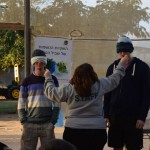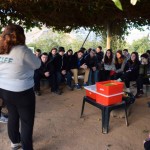Stony Brook University Sustainability Studies Program student Emily Nocito found that the Salad Trail in Israel’s Negev Desert is a most unexpected organic oasis.
The Negev Desert of Israel: not the place one would think about when it comes to agriculture, especially taking into account the varying temperatures. In the summer, temperatures can be as hot as 100°F, while at night can drop to nearly 30°F. However, one place, The Salad Trail, is defying all odds by creating a sustainable farm in the middle of this barren land.
How do I know this? I had the pleasure of visiting the farm, along with 39 other students, 7 Israel Defense Force soldiers, and four staff members during this winter’s Taglit program. In the middle of January, in this huge desert, I was picking kumquats straight off the tree. I ate many different types of tomatoes, all grown in a greenhouse. I witnessed some of my friends try a habanero pepper fresh from the vine (no way I was going to eat that!). The Salad Trail, thought up and owned by a lovely agronomist named Uri Alon, seeks to educate a wide range of ages through a commonality we all love- eating.
Along with learning about how they operate their farm- like all the water used is recycled wastewater from Tel Aviv, and the temperatures are controlled using energy from their solar panels, we learned about the struggles of sustainable growing in such harsh conditions while eating our way through the various greenhouses. In the strawberry room, we learned that the strawberries were grown in turf made from coconut shells rather than soil. When asked how they dealt with pests, our lovely tour guide surprised me with her response: Rather than using pesticides, they call up a kibbutz that breeds bugs. They tell the workers there what type of pest they have, and the members of the kibbutz send them a natural predator to the pest. Thinking ahead, they only send males, preventing their reproduction.
Never in my wildest dreams did I think I would find an organic oasis in the middle of the Negev.
By Emily Nocito
Sustainability Studies Program ’16
Coastal Environmental Studies Major
Ecosystems and Human Impact Minor






